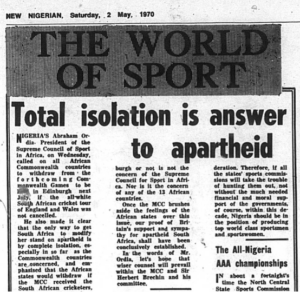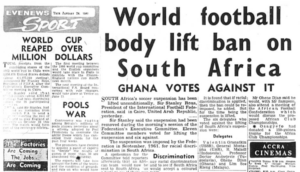AFCON Archives 1990s: Mandela’s South Africa win it for the rainbow nation
In this week’s AFCON Archives, the weekly deep dive into the history of Africa’s continental football tournament, we’re chronicling South Africa’s triumph at the 1996 Africa Cup of Nations.
Despite having been one of the four founding members of the Confederation of African Football (CAF) in 1957, the 1996 tournament was South Africa’s first. Due to their apartheid policies, they had been banned from the inaugural AFCON and then expelled from CAF in 1960.
As apartheid fell in the early 1990s and Nelson Mandela achieved the presidency, Africa’s footballing festival would mark the dawn of the rainbow nation…

Total isolation answers apartheid
Sports were an agent of Pan-Africanism in post-colonial Africa, and a tool through which anti-racist ideals could be projected on a global scale.
Apartheid South Africa ran foul of this sporting ethos and were therefore excluded from continental sporting events like AFCON.
AFCON Archives 1957: Egypt triumphant, South Africa sidelined
African delegates fought to ensure South Africa’s isolation from global football too.
Having catalysed FIFA’s suspension of South Africa in 1961, African delegates protested once more when they were readmitted in 1963.
It was Ohene Djan, the head of Ghana’s Central Organisation of Sports, who tabled the proposal for the suspension of the Football Association of South Africa in 1964.
Djan’s motion passed with 38 votes for and 15 against, leaving South Africa in a footballing wilderness once more.

An enduring ethos: Mandela spurns Abacha
The 1996 AFCON marked the emergence of a new South Africa, one that would not just conform to Pan-African ideals but actively promote them too.
Kenya had been set to host the tournament, but cited unpreparedness as they pulled out in November 1994.
Mandela, whose South Africa also hosted and won the 1995 Rugby World Cup, decided to stage the tournament.
Eight months separated Bok and Bafana triumphs
Before the action began though, Mandela made clear that this tournament would be infused by the same humanitarian spirit that had resulted in South Africa’s exclusion four decades ago.
The Nigerian Super Eagles were denied a place in South Africa’s AFCON as a result of the deplorable murders carried out by the Sani Abacha dictatorship.
Ken Saro-Wiwa and eight other Ogoni activists were executed by the regime in 1995 following their protests against Shell Oil’s devastation of the Ogoniland environment.
Ogoniland lies in the oil-rich Niger Delta and has been relentlessly exploited for its resources at a great environmental cost.
There was international outcry in the lead up to the executions, with Mandela amongst the leading voices.
The South African president was one of the world leaders who petitioned Abacha in a bid to save the lives of the ‘Ogoni 9.’
“Ken did nothing, he was killed by the government for fighting for the peoples’ rights” – Jim Wiwa, Ken’s father
When Abacha then sanctioned the judicial murder of these activists, Mandela called for international condemnation of the Abacha regime.
He expressed this condemnation through sports.
Dr Peter Alegi is a Professor of History at Michigan State University and the author of Laduma! Soccer, Politics & Society in South Africa and African Soccerscapes: How a Continent Changed the World’s Game.
He recalls Mandela’s decision to exclude Nigeria from the 1996 AFCON.
“That was a remarkably firm position that Mandela took because not everybody on the African continent was in favour of that.
“He was true to his belief in human rights and constitutionalism and he said that applies to Nigeria as much as it applied to the old apartheid regime or to any government around the world.”
From a footballing perspective, Nigeria’s omission disappointed Super Eagles fans hoping to defend their 1994 AFCON title.
AFCON Archives Nigeria: How Super Eagles started soaring
Nigeria also impressed at the 1994 World Cup
However, there was also a level of respect for Mandela’s stance.
Dr Chuka Onwumechili is an avid Super Eagles fan and the author of Africa’s Elite Football: Structure, Politics, and Everyday Challenges.
He says: “Nigerians believed that if the boys had walked into South Africa, that the trophy would have been theirs.
“But ultimately, if you look back at it today, I think that the decision of Mandela was the statesman’s decision.
“You can’t have a murderer be propped up as champion of Africa.”
A win for the rainbow nation
The Bafana Bafana marked their AFCON debut with their only triumph to date.
75,000 spectators descended on the FNB Stadium in Johannesburg to watch South Africa’s first ever AFCON fixture.
The Bafana Bafana rewarded the home fans with an emphatic 3-0 victory over Cameroon.
They edged past Angola in their second game in Group A and then progressed to the knockouts despite a 2-1 loss to Egypt in their final group game.
#OnThisDay in 1996, Mark Williams scored the match winner for #BafanaBafana 🇿🇦 in a 1-0 win over Angola in the Africa Cup of Nations hosted on home soil.
South Africa had defeated Cameroon 3-0 in the opening match seven days prior.
📷: PA / #backpagepix pic.twitter.com/28Lmeba5cS
— BackpagePix 📸 (@BackpagePix) January 20, 2021
A 2-1 quarter final victory over Algeria followed, before a 3-0 drubbing of Ghana booked Bafana’s spot in the final.
In front of 80,000 fans, a jersey-clad President Mandela amongst them, South Africa took on Tunisia with both sides searching for a first AFCON title.
Mandela (centre): A beautiful kit befitting a beautiful moment
The game remained goalless well into the second-half, leading South Africa manager Clive Barker to turn to his bench.
In what would prove a decisive change, Mark Williams replaced Phil Masinga in the Bafana attack during the 65th minute.
Williams wasted no time in rewarding his manager’s faith, opening the scores with a towering header in the 73rd minute.
Just two minutes later, Williams added a second, slotting home after running onto a delicate through-ball.
Classic Match
South Africa 🇿🇦 2 vs 0 🇹🇳 Tunisia
AFCON 1996
Final MatchGoals
🇿🇦
Mark Williams 73', 75' pic.twitter.com/sm0RL3u6uy— AfricaFootballClassics (@AfricaClassic) April 1, 2020
South Africa held their 2-0 lead, securing a triumph of monumental significance.
President Mandela joined the team to celebrate on the field, as he had done after the Springbok’s victory in the 1995 Rugby World Cup.
That Rugby World Cup victory has been immortalised by Clint Eastwood’s 2009 blockbuster film Invictus, but the AFCON victory is less well remembered, and unfairly so.
“It was just as important as the 1995 Rugby World Cup victory, but for different reasons.
“That Rugby World Cup victory that happened at home the year after Mandela was elected president was all about getting conservative, recalcitrant white South Africans to buy into the new South Africa.
“It showed that black South Africans wouldn’t push white South Africans into the sea. They even accepted the Springbok name and logo, which took a lot for black South Africans to tolerate and accept,” says Dr Alegi.
The AFCON victory, meanwhile, offered a striking portrait of the rainbow nation.
“I think it was seen by South Africans as more important in the sense that it really was a mirror reflection of who South Africans really are.
“The rugby team wasn’t. The rugby team had one player of colour in 1995 – Chester Williams,” Dr Alegi explains.
Chester Williams (R) in action
Players from the 1996 triumph certainly perceived themselves as representatives of the South African masses.
Captain Neil Tovey feels that Bafana Bafana resonated more strongly with the nation at large.
“The Springboks definitely kicked it off, and they gave us immense, immense inspiration.
“But the effect was small compared to what Bafana achieved. We were touching everyone’s lives,” he said.
Tovey and Mandela celebrate
The apartheid state only fell after decades of struggle from within South African and beyond its borders.
AFCON 1996 was an opportunity to celebrate the new South Africa, one seized by the continent as a whole.
“South Africa winning in 96 was a positive outcome because Africans had contributed so much to the struggle against apartheid. They are giving their solidarity, their material support, in many cases to the fight,” says Dr Alegi.
In South Africa, celebrations marked an optimism about the emergent nation.
“It was the climax of rainbow nationalism, the victory in the 1996,” Dr Alegi agrees.
You can read the full AFCON Archives collection here.